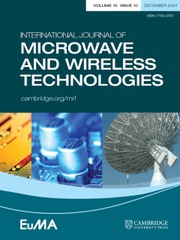Wire-medium loaded planar structures: modal analysis, near fields, and radiation features
Published online by Cambridge University Press: 12 April 2016
Abstract
A novel transmission-line model is used for the analysis of planar structures, including wire-medium (WM) slabs with vertically aligned wires. The network formalism allows for an effective determination of the relevant spectral Green's functions, of the modal dispersion equation via transverse resonance, as well as of the far-field radiation pattern produced by simple sources via reciprocity, as opposed to the more cumbersome field-matching approach. Numerical results, validated also against state-of-the-art simulation software, confirm the accuracy and effectiveness of the proposed approach. In particular, modal and radiation features are presented for a class of leaky-wave antennas based on planar WM loaded configurations covered by partially reflecting screens, for which leaky unimodal regimes are achieved by minimizing spurious radiation from the quasi-transverse electromagnetic (TEM) mode.
Keywords
- Type
- Research Papers
- Information
- International Journal of Microwave and Wireless Technologies , Volume 8 , Special Issue 4-5: EuMW 2015 Special Issue , June 2016 , pp. 713 - 722
- Copyright
- Copyright © Cambridge University Press and the European Microwave Association 2016
References
REFERENCES
- 6
- Cited by


